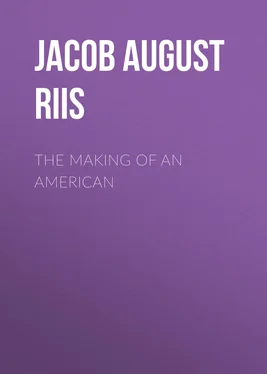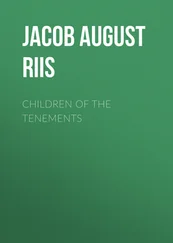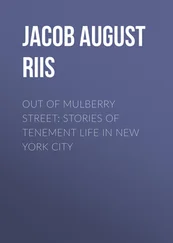Jacob August Riis - The Making of an American
Здесь есть возможность читать онлайн «Jacob August Riis - The Making of an American» — ознакомительный отрывок электронной книги совершенно бесплатно, а после прочтения отрывка купить полную версию. В некоторых случаях можно слушать аудио, скачать через торрент в формате fb2 и присутствует краткое содержание. Жанр: Биографии и Мемуары, История, foreign_edu, foreign_antique, foreign_prose, на английском языке. Описание произведения, (предисловие) а так же отзывы посетителей доступны на портале библиотеки ЛибКат.
- Название:The Making of an American
- Автор:
- Жанр:
- Год:неизвестен
- ISBN:нет данных
- Рейтинг книги:5 / 5. Голосов: 1
-
Избранное:Добавить в избранное
- Отзывы:
-
Ваша оценка:
- 100
- 1
- 2
- 3
- 4
- 5
The Making of an American: краткое содержание, описание и аннотация
Предлагаем к чтению аннотацию, описание, краткое содержание или предисловие (зависит от того, что написал сам автор книги «The Making of an American»). Если вы не нашли необходимую информацию о книге — напишите в комментариях, мы постараемся отыскать её.
The Making of an American — читать онлайн ознакомительный отрывок
Ниже представлен текст книги, разбитый по страницам. Система сохранения места последней прочитанной страницы, позволяет с удобством читать онлайн бесплатно книгу «The Making of an American», без необходимости каждый раз заново искать на чём Вы остановились. Поставьте закладку, и сможете в любой момент перейти на страницу, на которой закончили чтение.
Интервал:
Закладка:
If the coming of the invading army could have been timed to suit, the sea, which from old was the bulwark of the nation, might have completed the defences of Ribe without other expense to it than that of repairing damages. Two or three times a year, usually in the fall, when it blew long and hard from the northwest, it broke in over the low meadows and flooded the country as far as the eye could reach. Then the high causeways were the refuge of everything that lived in the fields; hares, mice, foxes, and partridges huddled there, shivering in the shower of spray that shot over the road, and making such stand as they could against the fierce blast. If the "storm flood" came early in the season, before the cattle had been housed, there was a worse story to tell. Then the town butcher went upon the causeway at daybreak with the implements of his trade to save if possible, by letting the blood, at least the meat of drowned cattle and sheep that were cast up by the sea. When it rose higher and washed over the road, the mail-coach picked its way warily between white posts set on both sides to guide it safe. We boys caught fish in the streets of the town, while red tiles flew from the roofs all about us, and we enjoyed ourselves hugely. It was part of the duty of the watchmen who cried the hours to give warning if the sea came in suddenly during the night. And when we heard it we shivered in our beds with gruesome delight.
The people of Ribe were of three classes: the officials, the tradesmen, and the working people. The bishop, the burgomaster, and the rector of the Latin School headed the first class, to which my father belonged as the senior master in the school. Elizabeth's father easily led the second class. For the third, it had no leaders and nothing to say at that time. On state occasions lines were quite sharply drawn between the classes, but the general kindliness of the people caused them at ordinary times to be so relaxed that the difference was hardly to be noticed. Theirs was a real neighborliness that roamed unrestrained and without prejudice until brought up with a round turn at the barrier of traditional orthodoxy. I remember well one instance of that kind. There lived in our town a single family of Jews, well-to-do tradespeople, gentle and good, and socially popular. There lived also a Gentile woman of wealth, a mother in the strictly Lutheran Israel, who fed and clothed the poor and did no end of good. She was a very pious woman. It so happened that the Jewess and the Christian were old friends. But one day they strayed upon dangerous ground. The Jewess saw it and tried to turn the conversation from the forbidden topic.
"Well, dear friend," she said, soothingly, "some day, when we meet in heaven, we shall all know better."
The barrier was reached. Her friend fairly bristled as she made reply:
"What! Our heaven? No, indeed! We may be good friends here, Mrs–, but there—really, you will have to excuse me."
Narrow streams are apt to run deep. An incident which I set down in justice to the uncompromising orthodoxy of that day, made a strong impression on me. The two concerned in it were my uncle, a generous, bright, even a brilliant man, but with no great bump of reverence, and the deacon in the village church where they lived. He was the exact opposite of my uncle: hard, unlovely, but deeply religious. The two were neighbors and quarrelled about their fence-line. For months they did not speak. On Sunday the deacon strode by on his way to church, and my uncle, who stayed home, improved the opportunity to point out of what stuff those Pharisees were made, much to his own edification. Easter week came. In Denmark it is, or was, custom to go to communion once a year, on Holy Thursday, if at no other season, and, I might add, rarely at any other. On Wednesday night, the deacon appeared, unbidden, at my uncle's door, craving an interview. If a spectre had suddenly walked in, I do not suppose he could have lost his wits more completely. He recovered them with an effort, and bidding his guest welcome, led him courteously to his office.
From that interview he came forth a changed man. Long years after I heard the full story of it from my uncle's own lips. It was simple enough. The deacon said that duty called him to the communion table on the morrow, and that he could not reconcile it with his conscience to go with hate toward his neighbor in his heart. Hence he had come to tell him that he might have the line as he claimed it. The spark struck fire. Then and there they made up and were warm friends, though agreeing in nothing, till they died. "The faith," said my uncle in telling of it, "that could work in that way upon such a nature, is not to be made light of." And he never did after that. He died a believing man.
It may be that it contributed something to the ordinarily democratic relations of the upper-class men and the tradespeople that the latter were generally well-to-do, while the officials mostly had a running fight of it with their incomes. My father's salary had to reach around to a family of fourteen, nay, fifteen, for he took his dead sister's child when a baby and brought her up with us, who were boys all but one. Father had charge of the Latin form, and this, with a sense of grim humor, caused him, I suppose, to check his children off with the Latin numerals, as it were. The sixth was baptized Sextus, the ninth Nonus, though they were not called so, and he was dissuaded from calling the twelfth Duodecimus only by the certainty that the other boys would miscall him "Dozen." How I escaped Tertius I don't know. Probably the scheme had not been thought of then. Poor father! Of the whole fourteen but one lived to realize his hopes of a professional career, only to die when he had just graduated from the medical school. My oldest brother went to sea; Sophus, the doctor, was the next; and I, when it came my time to study in earnest, refused flatly and declared my wish to learn the carpenter's trade. Not till thirty years after did I know how deep the wound was I struck my father then. He had set his heart upon my making a literary career, and though he was very far from lacking sympathy with the workingman—I rather think that he was the one link between the upper and lower strata in our town in that way, enjoying the most hearty respect of both—yet it was a sad disappointment to him. It was in 1893, when I saw him for the last time, that I found it out, by a chance remark he dropped when sitting with my first book, "How the Other Half Lives," in his hand, and also the sacrifice he had made of his own literary ambitions to eke out by hack editorial work on the local newspaper a living for his large family. As for me, I would have been repaid for the labor of writing a thousand books by witnessing the pride he took in mine. There was at last a man of letters in the family, though he came by a road not down on the official map.
Crying over spilt milk was not my father's fashion, however. If I was to be a carpenter, there was a good one in town, to whom I was forthwith apprenticed for a year. During that time, incidentally, I might make up my mind, upon the evidence of my reduced standing, that school was, after all, to be preferred. And thus it was that I came to be a working boy helping build her proud father's factory at the time I fell head over heels in love with sweet Elizabeth. Certainly I had taken no easy road to the winning of my way and my bride; so reasoned the town, which presently took note of my infatuation. But, then, it laughed, there was time enough. I was fifteen and she was not thirteen. There was time enough, oh, yes! Only I did not think so. My courtship proceeded at a tumultuous pace, which first made the town laugh, then put it out of patience and made some staid matrons express the desire to box my ears soundly. It must be owned that if courting were generally done on the plan I adopted, there would be little peace and less safety all around. When she came playing among the lumber where we were working, as she naturally would, danger dogged my steps. I carry a scar on the shin-bone made with an adze I should have been minding when I was looking after her. The forefinger on my left hand has a stiff joint. I cut that off with an axe when she was dancing on a beam close by. Though it was put on again by a clever surgeon and kept on, I have never had the use of it since. But what did a finger matter, or ten, when she was only there! Once I fell off the roof when I must crane my neck to see her go around the corner. But I hardly took note of those things, except to enlist her sympathy by posing as a wounded hero with my arm in a sling at the dancing-school which I had joined on purpose to dance with her. I was the biggest boy there, and therefore first to choose a partner, and I remember even now the snickering of the school when I went right over and took Elizabeth. She flushed angrily, but I didn't care. That was what I was there for, and I had her now. I didn't let her go again, either, though the teacher delicately hinted that we were not a good match. She was the best dancer in the school, and I was the worst. Not a good match, hey! That was as much as she knew about it.
Читать дальшеИнтервал:
Закладка:
Похожие книги на «The Making of an American»
Представляем Вашему вниманию похожие книги на «The Making of an American» списком для выбора. Мы отобрали схожую по названию и смыслу литературу в надежде предоставить читателям больше вариантов отыскать новые, интересные, ещё непрочитанные произведения.
Обсуждение, отзывы о книге «The Making of an American» и просто собственные мнения читателей. Оставьте ваши комментарии, напишите, что Вы думаете о произведении, его смысле или главных героях. Укажите что конкретно понравилось, а что нет, и почему Вы так считаете.












